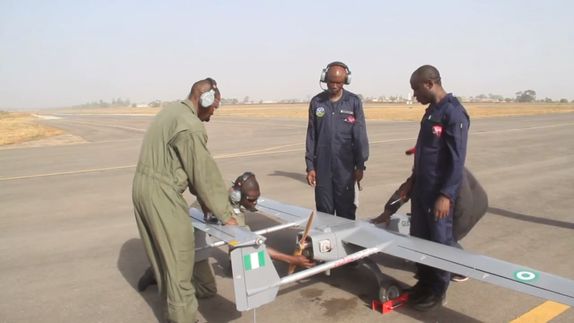There are no products in your shopping cart.
| 0 Items | £0.00 |

 AMERICA has agreed to train 144 Nigerian students on drone technology as part of a programme to assist in the war against terror and other services such as search and rescue missions as well as crop research.
AMERICA has agreed to train 144 Nigerian students on drone technology as part of a programme to assist in the war against terror and other services such as search and rescue missions as well as crop research.
Nigeria has made steps towards understanding drone technology but the process is still in its infancy as the country can only manufacture miniature spotters. With Boko Haram waging a war against the Nigerian state, drones are desperately needed to spot their camps in the northeast as well as detect movement.
Russell Brooks, the public affairs officer of the US consulate in Lagos, said the training of the Nigerian youths would be done in collaboration with the Global Air Drone Academy. Speaking during the Nigerian Youth Drone Academy workshop in Lagos, he said pupils and students from 12 primary and secondary schools would participate in the workshop, learning how to assemble and fly drones.
He pointed out that drones were changing the world, hence, the need to pay attention to such technology. According to Mr Brooks, drones are making agriculture more efficient, aiding search-and-rescue operations and delivering medicine to remote locations.
Mr Brooks said: "The possibilities for drones to help make our world better are endless and I am glad that the US mission is able to play a role in building a better Nigeria by supporting this project. I am excited to welcome public and private high schools from Lagos and Abeokuta, as they learn to become a part of this trend in aviation technology.
”Science, technology, engineering and mathematics (Stem) education is a big priority for the US government and we believe that every student throughout the world deserves a high quality education in Stem. This is in order to enhance their individual possibilities, as well as their ability to contribute to making our world a better place.
"Teaching children about drone technology is an ideal tool to introduce them to the fundamentals of Stem. It is a fun way to help them develop their cognitive, problem solving and critical thinking skills."
He added that when the US ambassador to Nigeria, Stuart Symington, opened American Space in Yaba in 2017, he pledged the American government’s support for projects that would expand the use of technology in Nigeria. Accorded to him, the US government has since funded a number of projects to increase Stem education in different parts of the country.
"We hosted RoboRAVE, a robotics education programme across several locations in Nigeria in 2017 and 2018 and we funded the establishment of a technology hub in Lagos that provides training and mentoring for persons living with disabilities. Last year we inaugurated the Global Air Media workshops in Lagos and in recognition of the programme’s success, we are repeating it this year,” Mr Brooks said.
Eno Umoh, the co-founder of Global Air Media, added: "You can use drones in agriculture, utilities, hospitals and emergency response, among others. When building a drone, it is important to identify the particular problem it is going to solve."
He said that people were sceptical about drones because of privacy, hence, the need to ensure ethical use by regulating them. Mr Umoh added that the trainees would also be enlightened on the safety and ethics of flying drones.